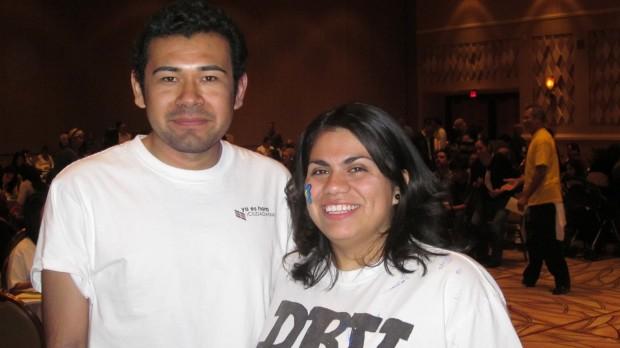Young, undocumented immigrants now able to apply for temporary quasi-legal residency
Supporters of the DREAM Act, like these activists in Las Vegas, won a partial victory this week. Young, undocumented immigrants can now apply for a sort of quasi-legal residency. (Photo by Jason Margolis.)
Undocumented immigrants between the ages of 15 and 31 are now eligible to apply for the right to live and work openly in the United States without fear of deportation.
That’s because of an executive order issued in June by President Barack Obama.
The new rule could impact an estimated 1.7 million people and workshops are being held throughout the country teaching people how to apply for the new status. At an event in downtown Boston, about 40 people crammed into a small room for a hybrid press conference and workshop.
“If I cry, let it be, cry with me too. My parents brought me here from the Dominican Republic when I was 8 years old with my sister,” said an emotional 20-year-old Isabel Vargas, with the Student Immigrant Movement of Massachusetts. “I know that my life is going to change from here on. I’m gong to be able to go to law school if I want to one day, be a lawyer, to defend all my fellow undocumented students.”
The new rule that makes this possible is called Deferred Action for Childhood Arrivals. People here refer to it as ‘DACA’ for short.
Attorney Nancy Kelly with Greater Boston Legal Services explained the basics to the group.
“You have to have arrived in the United States before you were 16 years of age. You have to be under 31 years of age as of June 15, 2012 — that’s the day the announcement was made,” she said.
Applicants also need to have completed high school or currently be enrolled, or have served in the U.S. military. They also must have spent the past five years in the United States.
Applicants must be able to document their education and their time in the United States and must be in good standing, legally.
“They will do a fingerprint check on everybody, and you will be disqualified if you have a felony on your record, or you have more than three misdemeanors, or a serious misdemeanor,” Kelly said.
If immigrants qualify, they’ll be given two-years of de-facto residency. They can reapply when the term expires.
Carlos Rojas, an 18-year-old high school graduate, moved to the United States from Colombia when he was 5. He said his mom brought him here to escape the violence in his country.
“When making the decision to come to the United States, my mother first went to the embassy to see if she could legally enter the United States. For anyone who has tried to do that, you would know that unless you have family members that are already US citizens here in the United States, unless you have connections, or unless you are a doctor or a scientist or a lawyer, there’s basically no way you will be given papers," Rojas said. “We had none of those things, so my mother decided to come on a visa, which we had for six months, and which we obviously overstayed. So after six months of being here, we became undocumented.”
Many people like Rojas were hoping for a comprehensive immigration reform bill passed by Congress. They lobbied vigorously for the so-called DREAM Act — that would’ve put young people like Rojas on a path to citizenship.
That’s not what is being offered today. The new rule essentially says you can stay temporarily, but that’s it. Rojas said he, and many others like him, have mixed feelings about what’s on offer.
"Deferred action, although it’s not everything — it’s not citizenship, it’s not amnesty — it’s actually a rather limited range of benefits. It’s the first step towards really owning my American Dream," he said.
For Rojas, that means being able to go to work legally and save money for college.
There are many who argue the new rule already gives illegal immigrants like Rojas too much, that he’s being given a free pass for breaking the rules.
"The way I’ve dealt with criticism in the past, which I have faced in the past, is by owning my story and sticking with it because I can’t apologize for being alive. And I can’t apologize for coming to this country as a young child," Rojas said. "I make no apologies for my family being here, we’ve contributed economically, we’ve contributed to taxes. Morally, we’ve never gotten in trouble with the law. We’ve been here for 13 years."
Rojas said he thought the argument, from some Republicans, that President Obama signed this executive order as an election-year tactic to try and appeal to Hispanic voters and get Latino votes was partly right.
"It was definitely a political tactic. It’s near election time, the Hispanic vote is an incredibly important vote. So it is definitely beneficial for (Obama) in terms of elections," he said.
But will it work? Rojas said he thought Latinos are more likely to vote for President Obama because of this.
“There’s no doubt. Yes," he said.
Rojas added that his community is also well aware that President Obama has deported more people than any president in history. But he still thinks President Obama is their best chance for working toward comprehensive immigration reform in the next four years.
Every day, reporters and producers at The World are hard at work bringing you human-centered news from across the globe. But we can’t do it without you. We need your support to ensure we can continue this work for another year.
Make a gift today, and you’ll help us unlock a matching gift of $67,000!
